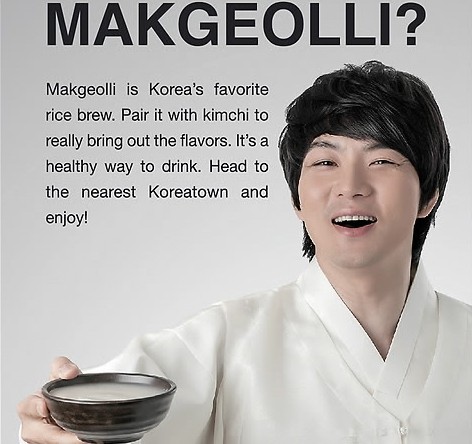- California Assembly OKs highest minimum wage in nation
- S. Korea unveils first graphic cigarette warnings
- US joins with South Korea, Japan in bid to deter North Korea
- LPGA golfer Chun In-gee finally back in action
- S. Korea won’t be top seed in final World Cup qualification round
- US men’s soccer misses 2nd straight Olympics
- US back on track in qualifying with 4-0 win over Guatemala
- High-intensity workout injuries spawn cottage industry
- CDC expands range of Zika mosquitoes into parts of Northeast
- Who knew? ‘The Walking Dead’ is helping families connect
Makgeolli sales slip amid sake boom

Korea’s hallyu actor Song Il-gook is posing with a bowl of makgeolli in its recent ad published by Wall Street Journal’s Europe edition. (yonhap)
By Park Ji-won
Domestic and overseas sales of “makgeolli,” a traditional Korean alcoholic beverage made from fermented rice, have fallen in recent years while imports of Japanese rice wine sake continue on an upward trend.
The domestic consumption of makgeolli fell to 366,470 kiloliters in 2013, down 6.8 percent from a year ago, according to Statistics Korea. Rice wine consumption here has been falling since 2011.
Outbound shipments of makgeolli have also been in decline for the past three years. Exports fell by 28.8 percent to 30,658 tons from 2011 to 2012 and by 40 percent to 18,222 tons from 2012 to 2013.
The size of the makgeolli industry is estimated at over 1 trillion won in 2013, according to market insiders.
Regulations and the changing tastes of consumers are key to the sluggish makgeolli sales.
Some experts point out that the regulation controlling the size of makgeolli breweries hampers the industry’s growth.
In September 2011, the National Commission for Corporate Partnership designated makgeolli as a product only to be produced by small and medium-sized firms. It has banned big firms from entering the market, which has also hindered investment in the industry.
Another challenge the industry faces is the changing tastes of consumers for alcoholic beverages.
“Fewer people are drinking makgeolli because of the strong image that it is for older people and has only one flavor,” the market insider explained.
Large retailers are also partly responsible for the falling sales because they prefer imported alcoholic beverages to traditional wine.
“Retail supermarkets are more interested in promoting imported beer and other alcoholic beverages while paying less attention to makgeolli,” Kooksoondang spokesman Ko Bong-hwan said.
Ko added that most of the 550 makgeolli producers are small and do not have strong distribution channels, and that breweries, customers and the government should work together to build a reliable and consistent retail network in order to raise the sales of the sluggish makgeolli industry.
In contrast to the falling sales of makgeolli, sales of imported Japanese sake have been rising.
Sake, a Japanese clear rice wine, has become popular in Korea in recent years owing to the increasing number of “izakaya” or Japanese-style pubs in the country.
Korea imported 4,367 tons of sake last year, up 15.4 percent from a year ago, according to data from the Korea Customs Service. Imports of sake have been rising for more than four years.
“The number of sake importers grew sharply as there was a so-called sake boom in the past few years among all consumer age groups in Korea,” said Lee Jin-myoung, CEO of Sakemart, a private importer of sake.
“Sake is easier to drink because people don’t have to be that formal to do so unlike when drinking wine. And it has a lower alcohol content than other options here,” Lee added.











